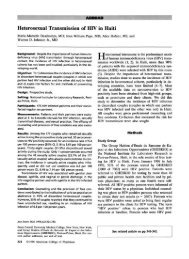Behavioural Surveillance Surveys - The Wisdom of Whores
Behavioural Surveillance Surveys - The Wisdom of Whores
Behavioural Surveillance Surveys - The Wisdom of Whores
You also want an ePaper? Increase the reach of your titles
YUMPU automatically turns print PDFs into web optimized ePapers that Google loves.
• To probe for additional information when<br />
necessary.<br />
• To ask your supervisor for assistance<br />
whenever you have a question which is not<br />
covered in this manual.<br />
• Not to give advice to respondents but to<br />
refer them to local resources or your<br />
supervisor.<br />
Beginning the interview :<br />
A respondent’s first impression <strong>of</strong> you will<br />
strongly affect his/her willingness to cooperate<br />
with the survey. <strong>The</strong>refore, it is very important<br />
that you approach each interview in a friendly<br />
and pr<strong>of</strong>essional manner. Guidelines for good<br />
interviewing include the following:<br />
Always remain neutral : Your job as an<br />
interviewer is to obtain the facts. An interviewer<br />
should be friendly, but firm, neutral, but<br />
interested. Your tone <strong>of</strong> voice, facial expressions<br />
and even body postures all combine<br />
to establishthe rapport you create with your<br />
respondent. Do not express surprise, pleasure<br />
or disapproval at any response or comment<br />
made by the respondent.<br />
Answer the respondent’s questions :<br />
Some respondents may question you about<br />
the purpose <strong>of</strong> the survey before agreeing to<br />
participate. Answer the respondent’s questions<br />
as directly as possible referring to the introduction<br />
paragraph on the front <strong>of</strong> each survey.<br />
However, if a respondent has questions<br />
about AIDS or other interview-related topics at<br />
any time during the interview, politely explain<br />
that you prefer to complete the interview first<br />
and discuss his/her questions after the interview.<br />
Once completed, direct the respondent to the<br />
nearest HIV/AIDS information resource (could<br />
be an NGO, a health facility, or any locally<br />
appropriate source) for more information. It is<br />
important to remember that your job is not to<br />
educate respondents, but only to collect<br />
information from them.<br />
Handling reluctant respondents :<br />
Occasionally, a potential respondent will<br />
refuse to participate in the survey. Do not<br />
take the initial unwillingness <strong>of</strong> a respondent<br />
to be interviewed as a final refusal. Try to put<br />
yourself in their position and think <strong>of</strong> factors<br />
that might have brought about this reaction.<br />
<strong>The</strong> respondent may not be in the right mood<br />
at that particular time or they may have<br />
misunderstood the purpose <strong>of</strong> your visit. Try<br />
to find out why the respondent is unwilling to<br />
participate, and respond accordingly. Some<br />
arguments you can use to persuade a respondent<br />
to participate are:<br />
• <strong>The</strong> respondent cannot be replaced by<br />
anyone else.<br />
• <strong>The</strong> information they provide will help to<br />
develop programs, which assist people like<br />
themselves.<br />
• If confidentiality is an issue, assure the<br />
respondent that his or her name will not go<br />
on the questionnaire. Questionnaires will<br />
only be identified by a number. Everyone<br />
working on the survey has pledged to<br />
maintain confidentiality. Never ask the<br />
respondent’s name.<br />
• However, in some circumstances a<br />
respondent may continue to refuse.<br />
In this situation, respect the respondent’s<br />
right to refuse, and thank the respondent<br />
for his/her time. Do not take these refusals<br />
personally.<br />
B EHAV I OR A L S U R V EI L L A NC E SURV EY S APPEN DI X 2<br />
287










